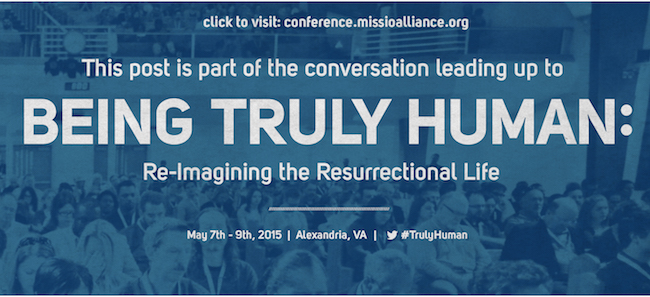Protest and Sacrament: How Space Produces Solidarity and New Identity
In our first piece, I (Ty) explored how public protests have the potential to become sacramental actions (like the Eucharist). In both the Eucharist and protests, there is an embodied, communally shared act that changes us and bears witness to a new reality. For our second post, Ruthie Johnson closely examines how this communal space renews our truly human Imago Dei through choosing solidarity.
The day after the non-indictment verdict over Ferguson was announced, I (Ruthie) took a handful of my students downtown to join in protest. It felt like the least I could to do try and honor their identity. That is, in a world that was screaming they were ‘less than’ I wanted to give their bodies a voice– one that said “you matter” and to stand in solidarity with them. I hoped that this shared action would be a way of supporting one another. We needed a new narrative for our brown bodies.
In moving toward Being Truly Human, it is important that we remember that the evangelical narrative has been largely influenced by colonialism. This means we often tend to think of others in a binary context of “us” and “them.” Who we are not, then, becomes “the other.” In order to imagine a shared existence, a space of embracing our own humanity, along with others, we need a new identity, one that is produced in the incarnation of Christ. To strip myself of my preconceived notions of the ‘other’ and move toward a shared identity takes more humility than I can give. It forces me to depend on my identity in Christ to reimagine a better humanity. Solidarity must become a ‘mode of identity’ in relationship, not just a model.
Last month, Ty did a great job of outlining Eucharist and how this sacrament is the practice of shared humanity. To take this a step further, one must ask “what happens in that space?” What are the spiritual implications of solidarity?
In Philippians 2 we see Christ as the example of solidarity.
Make your own attitude that of Christ Jesus, who, existing in the form of God, did not consider equality with God as something to be used for His own advantage. Instead He emptied Himself by assuming the form of a slave, taking on the likeness of men. And when He had come as a man in His external form, He humbled Himself by becoming obedient to the point of death—even to death on a cross.
Jesus did not count equality with God to be grasped but rather laid himself down.
We see Jesus exchanging his identity in order to reconcile us to God. This becomes our model of solidarity, humbling ourselves in order to elevate the other. Here we see two distinct actions:
- Choosing a new identity
- Choosing to share space
Shared experience creates the space to enter in with no assumptions. Dr. Gayatri Spivak comments “Solidarity comes from exchange of information and a bonding through acknowledgement of difference.” Solidarity “provides a basis for true communication and a common human future.”
When the space is chosen, it shows a desire to be humble, a willingness and pursuit of understanding the other’s perspective an identity. We open up more “possibilities of embodiment” than what our current narrative offers. We (as the church) can now move towards creating new and shared identities when we choose to engage in each other’s stories.
A secondary significance of space is that it is elected. The willingness of participation implicates a shared desire–it is the phenomenology of the shared practice that produces the value of the space. It is the choosing to participate in an action to bond, show membership with that shows value to the other. Sekimoto (2010) points to the importance of spatiality in identity formation, “When space is understood in relation to embodiment, it becomes clear how space shapes, and is shaped by, what I call the possibilities of embodiment. […] Cultural knowledge and membership provide multiple and varying possibilities of embodiment and occupying space with and through the body.”
Space and identity work together to give opportunity to reimagine our Humanity together.
Protest becomes the space where personal experience opens new narratives of spiritual embodiment and formation, moving personal identity into a shared identity. This shared act has become solidarity: a retelling of identity, a place where we create together our reflection of Christ and reject the old binary narratives that isolate the “other.”
Solidarity is the opportunity to reimagine myself and the hope of Christ within the struggles, fears, joys and experiences of another.
—
[Image by Terence Haircloth – Solidarity Mural, CC via Flickr]Sekimoto, S. (2012). A Multimodal Approach to Identity: Theorizing the Self through Embodiment, Spatiality, and Temporality. Journal of International and Intercultural Communication, 5(3), 226-243.
Smith, K. H., In Lalitha, J., & In Hawk, L. D. (2014). Evangelical postcolonial conversations: Global awakenings in theology and praxis.
Spivak, G. C. (1988). Can the subaltern speak?.





